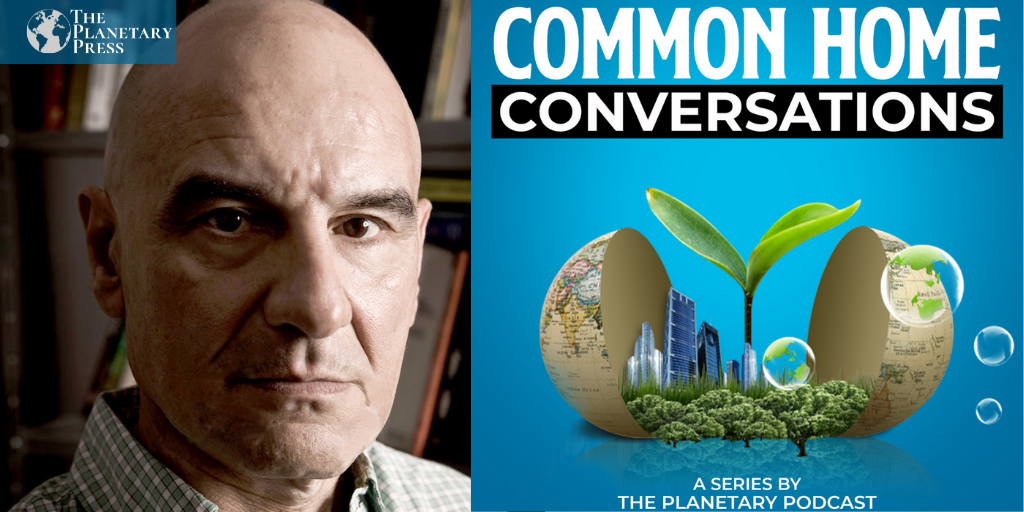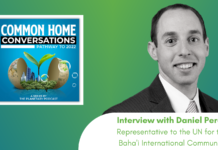Interview Transcript
Transcribed by Otter AI
Kimberly White
Hello and welcome to Common Home Conversations. Today we’re joined by Eduardo Viola, Political Scientist and Professor of International Relations at the University of Brasilia. Thank you so much for joining us today!
Eduardo Viola
It’s a pleasure to be with you.
Kimberly White
So you’re a Professor at the University of Brasilia and a Senior Researcher of the Brazilian Council for Research. You’re also the Chair of the Brazilian Research Network on the International System in the Anthropocene and Climate Change. Can you tell us more about these experiences and the focus of your current research?
Eduardo Viola
Okay, well, I’ve had a very long career as a Professor of International Relations. My focus of research, not always, but at least in the last 35 years, has been on environmental issues, both in Brazil and internationally, and the Brazilian foreign environmental policy. So I am in international relations with a focus on environment and climate change and energy transition. My research has been, over the years, focused in Brazil and South America but also following and studying directly the trajectory of emissions, climate policies of major players- United States, European Union, Japan, Russia, China, India, and Brazil. And right now, I am a lot involved with specific research about the South American governance of climate and biodiversity in the Pan-Amazonia, not just the Brazilian Amazonia but the whole Amazon, and comparing politics of different countries, particularly Brazil, Peru, Bolivia, and Ecuador.
Kimberly White
That’s really interesting! So, the Amazon Basin is experiencing threats on multiple fronts. One threat is deforestation. As we have seen in recent years, deforestation for mining, or conversion to agriculture and pasture for beef, has resulted in a staggering amount of biodiversity loss, and the massive fires seen over the last few years have dominated global headlines. At the same time, the melting of the arctic ice sheet and the massive glacial melting in Greenland from global warming is changing the circulation of the Atlantic, reducing the rainfall coming into the Amazon from the ocean. These threats highlight a need for both domestic and international policy solutions. Currently, it appears that economic development outweighs environmental protection at the federal level. Given your expertise, how can Brazil best reconcile its need for economic development with its growing environmental concerns?
Eduardo Viola
So, first of all, we could say that since 2013-14, economic growth has prevailed over environmental protection in the Amazon. But right now, it is extreme because it’s actually promotion of deforestation, open and consistent promotion of deforestation. Deforestation right now in the Brazilian Amazon has several players. So we have got landowners, backwater landowners, very small capitalization, let’s say, that promote illegal deforestation. We have people that are not landowners, but they occupy the lands and open the forest in order to become owners of the forest; we call these “grileiros” in Portuguese in Brazil. We have illegal gold mining, there is a lot of illegal gold mining in the Amazon, but this is not just in the Brazilian Amazon; it is also in the other upstream countries of the Amazon. Right now, we can say that mercury pollution in the middle and lower Amazon Basin is mostly used in upstream countries, but still, let’s say the Brazilian gold miners are constrained a little in relation to using mercury more rationally.
We have other minerals also that are illegally mined in the Amazon Basin. The fifth player that is important in this process of deforestation is the invaders of Indigenous territories. As you probably know, in the case of Brazil, almost 17 percent of the area belongs constitutionally to the Indigenous population. But there are a lot of invasions, sometimes with some cooptations of parts of their Indigenous tribes. And it is very interesting because Brazil has much more strict environmental protection legislation. For example, there is a significant part of logging that is produced illegally in the Brazilian Amazon, but it is moving to the border to Peru, in which the environmental legislation is much weaker.
So those are the major drivers of deforestation in the Amazon. But you need to consider, generally speaking, that the Brazillian Amazon is populated by around 25 million people, most of them living in the cities but in precarious conditions, generally speaking. So there is a major problem of lack of opportunities, which promotes or creates incentives for poor people living in urban areas to go to the forest to deforest illegally, many times working for bigger players that are driving the deforestation. But in all the cases, those are all players that are small compared to the large players in Brazil. Big companies have been very relevant in deforestation in the Amazon until around one decade ago, particularly during the period of dramatic control and reduction of deforestation, 2005 to 2012. During this period, the major companies were banned on the policy of illegally deforesting the Amazon, and they moved because of the questions of prestige or branding and all these kinds of things. And because they have the possibility of deforesting legally in the Cerrado savanna, that is to the south of the Amazon, in which the rate of deforestation in the last 20 years has been much higher than in the rainforest.
Kimberly White
Illegal logging has been a problem for all of the Amazonian countries, right? I think it was in 1998 that Brazil had commissioned a report that found that 80 percent of logging in the Amazon was done illegally.
Eduardo Viola
Yes, yes. Now it is less than that but still significant, but the data are very precarious. They are all estimations. We know how a lot of loggers moved from illegally to legally, particularly at the time during the most consistent anti-deforestation policy. But there are still a lot, and now it’s growing. In the last year, the amount of illegal logging compared with the legal has grown.
Kimberly White
We had similar problems here in the United States with the last administration as far as environmental policy goes. Policies were revoked or basically dismantled. Recently, I read that, under Brazil’s current administration, the selective logging that was legal has more than doubled since 2019.
Eduardo Viola
Yes, or more than that. Now, we have logging entering new areas. For example, historically, the logging was more in the state of Pará and also in the state of Rondônia. In the last years, there was a movement, expanding the frontier of deforestation and illegal logging to the southeast of the state of Amazon, Amazonia.
Amazonia is very large. It is as large as Alaska; it is 1.2 million square kilometres.
Kimberly White
That’s interesting- I had no idea that it was roughly the size of Alaska! So a few minutes ago, you mentioned something regarding Indigenous communities. You mentioned that they were constitutionally protected. Could you elaborate on that and what that means versus something like land demarcation?
Eduardo Viola
Because the constitutional protection has been formally legally very strong, because there are a lot of areas that have been demarcated- the surface that is already under the status of Indigenous territory is very huge. There are some areas that have not been demarcated yet but are eligible for demarcating new Indigenous territory, but this government has said there will not be any more approval of new Indigenous territory. So, we have two problems. One is the areas that were considered to be demarcated and have been postponed. They are in limbo right now- a campaign from the government against new demarcations. The other issue is the issue of what happened in the areas that have already been demarcated. So the problem here is how they are illegally invaded.
Anyway, why did this happen? Because the rule of law is precarious in the Amazon and much more precarious under the current administration.
Kimberly White
Now, we have seen an increase in proposals for green recovery plans as well as more ambitious climate pledges. Can we anticipate similar initiatives from Brazil at the national or subnational level?
Eduardo Viola
The Brazilian national government has been strongly anti-environment. And more recently, they changed the discourse, very recent. Actually, what happened was the Bolsonaro administration became completely isolated. Once Biden took over in the United States, now, you have a President of the United States that is strongly committed to climate change and to give priority to climate change, decarbonisation, and mitigation of climate change. And so, for that reason, there was pressure growing, and there has been a change in the discourse of the Brazilian government. If you essentially compare the discourse of Bolsonaro in the UN General Assembly in September of last year and the discourse of Bolsonaro in the Earth Summit. In September last year, Bolsonaro was saying that Brazil was a country that protected the Amazon more. That there was a very unfair global campaign against Brazil, that the foreign interests were interested in undermining the sovereignty of Brazil in the Amazon. And now Bolsonaro continues lying, he continues saying that it protects a lot of the Amazon, it is a major champion of protection, environmental champion in the world, but he has recognized for the first time that there is a major problem of deforestation in the Amazon. And now they say that we can’t control this without foreign money, and this is the new position.
So, more or less, this was the battle between the Bolsonaro administration from one side and the Biden administration, the UK, and European Union in the last two months, let’s say. The Brazilian government were saying, “Okay, we will significantly reduce deforestation. You pay before, and we apply according to our dynamic, we apply the money to reduce deforestation.” But the US government and the European governments were saying, “No, it’s the opposite. We are ready for some financial contribution, though we know that you, Brazil, have been capable of dramatically reducing deforestation between 2005 and 2012 practically without foreign aid. You are a middle-income country, not a low-income country. So you have the capabilities.” And Brazil is the only middle-income country that has a high proportion of deforestation in their carbon emissions. This is typical from low-income countries. So northern governments know very well the Brazilian situation, even because this is an open country with free press and a lot of opposition also. So there was a clash.
Kimberly White
No, I agree. And we have seen results-based payments in relation to deforestation work, like for example, Norway and Indonesia. But that took almost a decade for Indonesia to decline its deforestation to prompt those payments from Norway. So it’s interesting to see how Brazil presented that.
Eduardo Viola
Yeah, interesting, you are mentioning Norway. The first fund for reducing deforestation from Norway was for Brazil and the second was Indonesia. And for many years, because this fund started around 2010, something like this and was growing. And during many years, this was the contribution, let’s say, mostly they were supporting sustainable development, small projects in the Amazon. The fund was managed by the Brazilian Development Bank; it’s a very capable bank. So the idea is that if you reduce deforestation, we’ll support sustainable development, but the money could not be used directly for operational activities of reducing deforestation. You need to pay with your regular budget, the reduction of deforestation. And if you do this, we’ll contribute to promoting projects of sustainable development. And this happened, let’s say, since the late 2000s until 2016. But in 2017, Norway found that deforestation had increased significantly in 2015 and 2016, and so Norway reduced the amount of money liberated for the fund because Brazil was not accomplishing the commitment of reducing deforestation. And there was further down another problem because of the dramatic reduction of the budget of the Minister of the Environment in 2017 and ’18. Norway allowed that some of the Amazonian funds be used for complementing operational activities of the IBAMA, for example, and the Environmental Protection Agency of Brazil. So, this was new, and this was a little disappointing for Norway. Now I am saying Norway because Germany contributes also, but the contribution of Norway is more than 90 percent. Afterward, the first year of the Bolsonaro administration, the Ministry of Environment tried to use the money of the fund in a way that completely not corresponding with the contractual obligations. And so the Amazonian fund froze. Another thing Indonesia has got a more stable trajectory of deforestation reduction. The process of reduction was slower than in Brazil, but there has not been a significant reversion. Anyway, Indonesia is far away from what was achieved by Brazil in 2012/2011.
Kimberly White
Yeah, we’ve seen a major decrease in the amount of tree cover loss in Indonesia since the agreement with Norway. I believe the first payment was prompted in 2019 because of a significant drop in primary forest loss. It was very impressive, especially given all of the issues.
The World Resources Institute reported that Indonesia saw a 60 percent drop in tree cover loss and primary forests in the year 2017 compared with the previous year, which was equivalent to a carbon dioxide emissions reduction of burning 199 billion pounds of coal. So it was a significant reduction, and so that’s impressive because the country has been having a lot of issues with the expansion of palm oil plantations, pulp plantations, mining, logging, you know, a lot of similar issues that we see in Brazil. So it’s interesting to see, and hopefully, we can start to see similar initiatives with Brazil as we head out of this pandemic. And we really need to get more ambitious climate initiatives, so I was interested to see Brazil’s announcement at the Climate Leaders Summit. What do you think of the commitments from Bolsonaro on ending illegal deforestation by 2030 and achieving carbon neutrality by 2050? Do you think they will become a reality? And what are some of the challenges to that happening?
Eduardo Viola
The announcement by Bolsonaro in the Earth Summit is the old Brazilian standing commitment in Paris in 2015. What Bolsonaro did is confirm. Because the previous two years have been, “I don’t care anymore about this. This is not mine; this was produced by the previous government. I don’t agree with that.” So, they got recommitted, not a new commitment. What is new is the commitment to zero carbon in 2050, the announcement in the Earth Summit, because, in December, the Brazillian proposal for the Glasgow conference was carbon neutrality in 2060. So this is new, but still, this is something very far away, remote in time, and considering the Bolsonaro administration’s credibility is extremely low, internationally and nationally, because there is something very important to understand and let me expand a little bit about this. All the deforesting, all the illicit, in the Amazon, okay? It is the core electoral base of Bolsonaro. Bolsonaro has two, in relation to deforestation and environmental politics, has two bases, that is, around 15-20 percent of the population.
On one side are the people who benefit from deforestation and illegal activities in the Amazon, that is, not just people that do directly the activity, but also people that live in the cities in the Amazon. So this is one part. The other part is the more ideological anti-environmental support of Bolsonaro. So, this is the core base of Bolsonaro. And this is a major reason, independent of the mind of Bolsonaro or the feelings of Bolsonaro, that is why these commitments, the announcements are not related to the rest of the Bolsonaro administration. If Bolsonaro is defeated in the 2022 election, there will be a major shift in the Brazilian climate, the Amazonian environmental policy, and other policies. What Bolsonaro announced could become a reality if there is a new administration starting in 2023. But it’s sadly not something that will happen during the rest of the Bolsonaro administration because of the reason I mentioned in relation to their electoral base, core base. But also because the whole life of Bolsonaro has been committed to anti-environmental policy, considering the environmental movement against the Brazilian national interest and agencies, agents of foreign powers.
Kimberly White
Well, hopefully, we start to see some of that initiative after this administration. I know here in the US, we had similar issues. But in January 2021, we had the Biden administration takeover, and we’re starting to see a lot more environmental policies and then rejoining the Paris Agreement. So it’s kind of I feel like it’s revitalized the environmental movement here in the States.
Eduardo Viola
Oh, yeah. Despite Bolsonaro, there has been a significant reinvigoration of, generally speaking, the environmental movement exactly because of the terrible policy of Bolsonaro. So the environmental movement is reinvigorating. And the general receiving society in relation to the environment and a new driver that is very important is now there are a lot of Brazilian corporations that are engaging consistently, with the idea of earth, with environment social governance, that is kind of the mantra of the corporation in the last years. So there are a significant amount of Brazilian corporations engaged in this. So this is a new dynamic because Brazilian corporations have not been committed generally to climate change in the past, and now, a significant part of them are committed. So this, you have this, and we also have a lot of governors. So some national governments, a lot of state governors, both in the Amazon and outside the Amazon, that are committed to climate policies that are better, at least, than the federal government.
Kimberly White
Now, as an expert in international relations, what do you see as the primary challenges of reaching an internationally binding treaty such as the proposed Global Pact for the Environment?
Eduardo Viola
Well, this kind of treaty is very, very ambitious. I think the times are coming in which it will become possible. Okay, in which forces why? Because we clearly have a realization in most of the global elites and a significant amount of the mass public, particularly in the Western world, but also outside the Western world, that is climate change, biodiversity erosion, ocean acidification, and plastic pollution, issues like this are becoming major risks and threats to humanity. We are living through a significant change in mindset. Because of this, we are creating the basis for a very ambitious treaty like you mentioned.
Kimberly White
Thank you, Eduardo. Before we go, is there anything else you’d like to share with our audience?
Eduardo Viola
We are right now in 2021 in a moment that is, from an objective point of view, much more difficult than at the time of the Paris Agreement five years ago because of the warming of the world, of the planet has accelerated in the last years, and because the frequency and intensity of extreme weather events have also accelerated. But from a kind of awareness and consciousness of humanity, we have a better situation. And I would say that this better situation is because of three drivers. First, the COVID pandemic, that has produced an increased awareness about what is called the intangible risks or threats to humanity, like pandemics, for example. This is something that this tangible, has been for decades for the scientific community, but it’s intangible for most people. And it’s similar to climate change. So, that climate change is becoming more tangible for sure, because of the extreme weather events, not because of the 1.2 degrees warming of the earth, because this is very abstract by 90 percent of the people. So, there is a connection. So we have a new situation that needed still to be consolidated, but I think it likely will be consolidated in which the world was remote before the pandemic or less tangible has become strongly tangible. And so, this is a major, major factor of transformation, very positive. The second one is the transformation in most of the global corporations in the western democracies in the last years. This is reflected a lot in what had happened in the last meetings of the World Economic Forum. So I say the global corporations, most not all, certainly not the oil, coal, and gas corporations, but most corporations have incorporated the climate risk in their planning process and in their investing decisions. And also, the global investing funds have incorporated these criteria. So this is something very powerful in terms of future allocation of capital. And this is something that is valid for the United States, Canada, the UK, the European Union, Japan, South Korea, Taiwan, Australia. Okay.
The western world, in the political meaning, let’s say, but it’s also something that is targeted to come in countries like China, for example. That still is far away compared with western corporations. Okay. But this is a major, major driver, a very positive factor that was not present in 2015 or just at the beginning. And the third driving force is the change of administration in the United States. I say major change because it’s not just coming back to the Obama administration, that it would be a relatively poor transformation, something very deep. It’s a major realization of climate change by the Biden administration. At this point, the Biden personality is key, of course, because he was in the Obama administration and was much less ambitious at that time. So I think this is very important.
Kimberly White
All right, and there you have it. While our global community faces a myriad of environmental, social, political, and economic challenges, we now have the realization that issues such as climate change, biodiversity loss, and ocean acidification pose a major threat to humanity. The change in mindset that we are witnessing creates the basis for a new and ambitious treaty like the Global Pact for the Environment. That is all for today, and thank you for joining us for this episode of Common Home Conversations. Please subscribe, share, and be sure to tune in on June 2nd to continue the conversation with our special guest, Thomas Boudreau, Professor of Conflict Analysis and Dispute Resolution at Salisbury University. And visit us at www.ThePlanetaryPress.com for more episodes and the latest news in sustainability, climate change, and the environment.
For more episodes, visit Common Home Conversations







